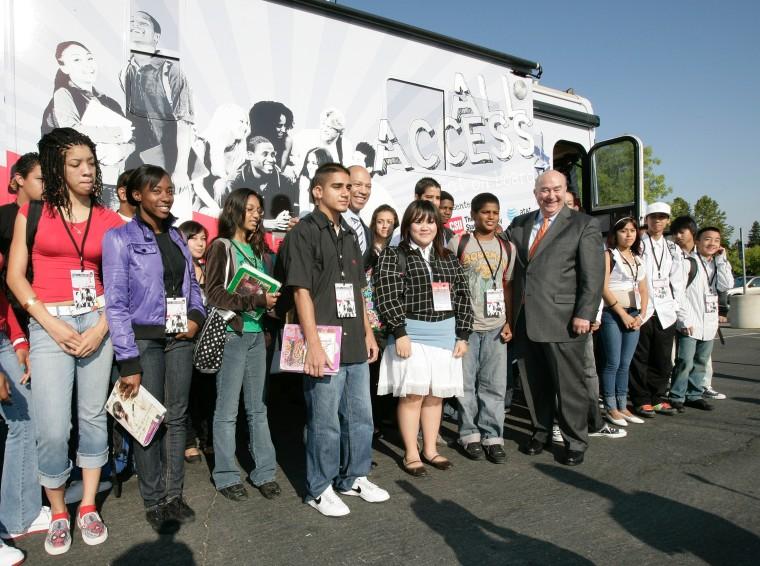CSU tours high schools
AT&T Califonia President Ken McNeely and California State University Chancellor Charles B. Reed stands with Valley High School students during the CSU Road to College in Sacramento on Sept. 10. The tour will end on Oct. 3, at a high school counselor’s conference in Santa Clara.:
September 26, 2008
Tricked-out, customized buses usually bring to mind rock stars or in this election year, presidential candidates. But when the California State University’s new 40-foot coach arrives at high schools, the focus is on college preparation.
The CSU started the Road to College tour this fall with a $1.6 million donation from the AT&T Foundation and has planned stops at six California high schools in urban areas, as well as college fairs and high school counselor’s conferences.
Students board the bus and use laptop computers to access information on applying to the CSU system. CSU officials are available to answer questions about campus features and amenities. Students from nearby CSU campuses also attend and offer firsthand knowledge of student life.
The effort kicked off at Valley High School on Sept. 10 in Sacramento and continues through Oct. 3, when the CSU begins accepting applicants for fall 2009.
Erik Fallis, spokesperson for the CSU Chancellor’s Office, said he does not know of any academic institution using a similar method.
Keven Macdonald, principal of Valley High School, said that having the bus come to campus made the process of college planning less abstract for students. He said his school has raised its standardized test scores by 58 percent in the last three years and has programs in place to encourage students to continue to four-year colleges. When students have completed the CSU’s A through G requirements, they are called into their counselor’s office and asked to complete a CSU application. The goal is to change students’ attitudes and convince them that a high school education is no longer enough.
“Valley High School is not a four year school,” Macdonald said. “Valley High School is the beginning of an eight year program.”
The bus tour is targeting students from socioeconomically disadvantaged areas. To reach these students, the CSU selected high schools in urban areas where students were less likely to attend college. Besides the one stop in the Sacramento area, the bus will travel to Los Angeles, San Diego, San Jose, Fresno and Oakland.
“They chose our school, in my mind, because our school represents every challenge that’s facing the California student today,” Macdonald said. “Everything from socioeconomic challenges to cultural issues to the achievement gap.”
California State Superintendent of Public Instruction Jack O’Connell, CSU Chancellor Charles Reed and Sacramento State President Alexander Gonzalez attended the opening event at Valley High School.
“The students I spoke with want this information so they can make the right decisions about their futures, and the bus provides a one-stop shop that we can take directly to their neighborhoods,” Gonzalez said.
Valley High School already enjoys a strong relationship with Sacramento State. The school is part of the “Sac State for All” program in which the Elk Grove Unified School District pays students’ application fees, and students can be admitted to Sac State on the spot by admissions counselors at certain school events. This led to 116 students being admitted from Valley High last year.
While there are no plans to continue the bus tour past this fall, Fallis said the information the tour brings to students will still be available online.
The CSU is also developing a new pilot program called the CSU College Corps that will enlist upper division college students and graduate students to visit high schools and assist students who are preparing for college. They plan to begin the program at CSU San Marcos, Los Angeles, Bakersfield, Fresno and East Bay, and aim to advise 1000 students each academic year. The project will be funded from the same $1.6 million grant from AT&T and may be expanded in the future to additional locations.
“The goal is to augment the work of high school guidance counselors who are increasingly challenged to provide assistance with pre-college academic advising and college course preparation because of high demands on their time for their own coursework, curriculum and mandatory testing,” said a press release sent out by the Chancellor’s Office.
The California Teachers Association, incidentally, held a bus tour last spring called “Cuts Hurt” to protest the looming state budget crisis. Counselors and other support staff are often the first to be laid off, the union’s vice president Dean Vogel said in the organization’s newsletter.
Sam Pearson can be reached at [email protected]





























































































































